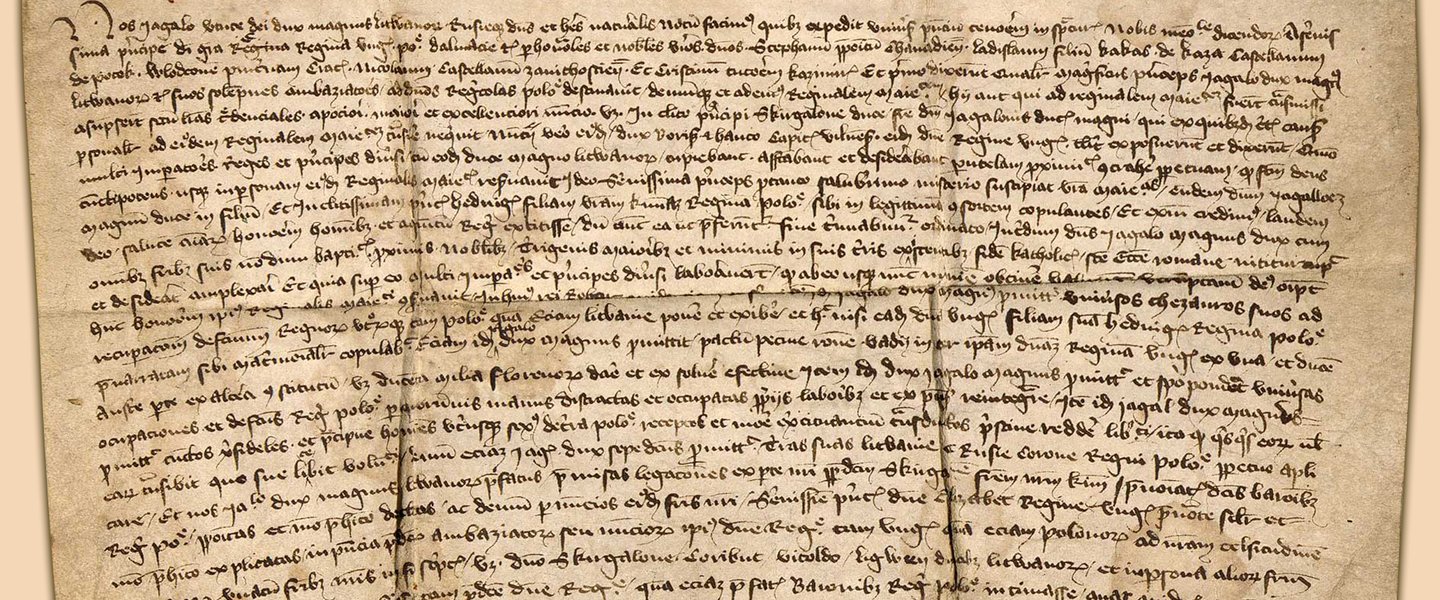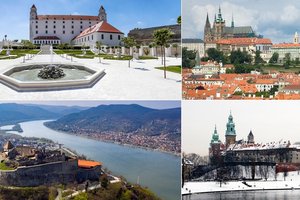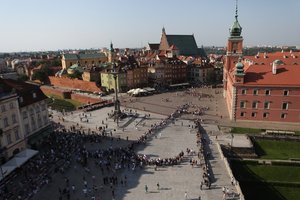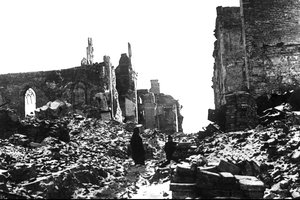Poland & Lithuania. A union of equals
Edward Gibbon, in his "History of the Decline & Fall of the Roman Empire", observed that "history is little more than a register of the crimes, follies, and misfortunes of mankind." Gibbon, one of the great paladins of the Enlightenment, looked back at the past with a considerable dose of cynicism. According to him, there was a one-word answer to the question "Why did Rome fall?": "Christianity." His views were considered scandalous even in the times of Voltaire, Rousseau and Hume.
 Today, however, many historians increasingly adopt Gibbon’s principles according to which the historian should act like a judge, condemning the past crimes of humanity according to the ethical standards of our times.
Today, however, many historians increasingly adopt Gibbon’s principles according to which the historian should act like a judge, condemning the past crimes of humanity according to the ethical standards of our times.
I do not follow the Gibbonian ethic. I am a historian, not moral philosopher. As the English novelist LP Hartley rightly observed: "The past is a foreign country; they do things differently there." I therefore agree with the great French medievalist Marc Bloch when he wrote: “[the] satanic enemy of true history [is] the mania for making judgements." Historians should explain, not judge. The most important word for them is ‘Why?’
* * *
It was in this spirit that I approached the writing of my book, The Oxford History of Poland-Lithuania. The Making of the Polish-Lithuanian Union 1385–1569. When, in the late 1990s, Robert Evans, the editor of the Oxford University Press series on post-medieval Europe, invited me to Oxford and asked me whether I would like to write a book on the history of Poland for the series, I said “no”, because the Polish state formed only a part of a greater political community: the Commonwealth of the Two Nations. I therefore told Professor Evans that while I could not write the book he proposed, I would very much like to write a book on the history of the Polish-Lithuanian union.
Above all I wrote this book for myself, because I wanted to understand, and the more I read about the union, the less I understood. Its history was told almost exclusively through the prism of national history. Political history has since the nineteenth century been dominated by the history of states and nations, and above all by the history of the nation-state. Unions, however, sit uncomfortably within this framework. National teleologies speak of independence, sovereignty, and of struggle against the enemies of the people. Memorials are built to honour the memory of national heroes: William Wallace and Robert the Bruce in Scotland; Chmielnicki in Ukraine; Gedymin and Vytautas in Lithuania; Kościuszko and Pułaski in Poland.
Few monuments honour the founders of unions. There are statues to Robert Schuman, the father of the European Union, in Thionville, Luxembourg, and Brussels, but people do not rally around them every year in large numbers as Scottish Nationalists rally round the statue of William Wallace in Aberdeen. On the contrary, Jagiełło was long considered a traitor in Lithuania; in Scotland the poet Robert Burns called the signatories of the 1707 Act of Union with England "a parcel of rogues in a nation."
 Polish historians do not, on the whole, have such a negative view of the Polish-Lithuanian union, but many have agreed with Michał Bobrzyński, who wrote that "the union as it was formed [at Lublin] was a fundamental error. The Polish nation had not toiled with sweat and blood for two centuries to civilize the Eastern wastelands to see them turn into a nest of magnate anarchy and hubris."
Polish historians do not, on the whole, have such a negative view of the Polish-Lithuanian union, but many have agreed with Michał Bobrzyński, who wrote that "the union as it was formed [at Lublin] was a fundamental error. The Polish nation had not toiled with sweat and blood for two centuries to civilize the Eastern wastelands to see them turn into a nest of magnate anarchy and hubris."
For many Lithuanian, Ukrainian, and Belarusian historians, who did not consider their ancestors to have inhabited wastelands, the union was also, for very different reasons, a catastrophe and a major obstacle to the creation of the modern nation. They treated the Jagiellonian idea as an embodiment of Polish imperialism, arguing that the union and the resultant cultural polonization deprived the Lithuanian, Ukrainian and Belarusian nations of their elites, thereby impeding and slowing their cultural development.
* * *
When reading these negative interpretations, I asked myself two key questions. If the union was such a bad idea, why was it ever formed and why did it last for more than 400 years? Most medieval and early modern unions were short-lived. The Polish-Czech union under Vaclav II lasted five years; the first Polish-Hungarian union lasted twelve years; the second a mere four. I will not mention the union between Great Britain and Europe; it is too sensitive an issue.
The Polish-Lithuanian union must, therefore, have rested on more solid foundations. What was the secret of its longevity? In my book I develop two main concepts to explain this conundrum. Firstly, I argue that the union was a common project from the outset, and not something invented by the Poles and forced upon the Lithuanians and the Ruthenians. The union was a process, not a moment; its final shape, as sealed in Lublin in 1569, was a result of a protracted dialogue between the elites of the kingdom of Poland and the grand duchy of Lithuania. Moreover, in the end it was the Lithuanian, not the Polish, concept of the nature of the relationship between the two realms within the union that triumphed.
This is a bold claim. To understand it, it is necessary to consider the second argument of my book, which rejects the traditional view that before 1569 the union was exclusively personal or dynastic in nature and that the relationship between the two realms was so loose that it was broken on three occasions following the election to the grand ducal throne of Švitrigaila (1430), Casimir Jagiellończyk (1440), and Alexander (1492).
This view rests on shaky foundations. Historians have long disputed the meaning of the apparently imprecise term applicare which appears in the 1385 Krewo Act. In considering the meaning of this "joining" of the Grand Duchy to the Crown, almost all historians apply the anachronistic post-medieval concepts of sovereignty and statehood. Krewo, however, was a dynastic settlement, although it was not a simple agreement between two dynasties; there was another party to it: the political community of the Polish Crown (communitas regni). Contemporary Polish politicians therefore had their own interpretation of applicare: they believed that Jagiełło’s accession to the throne in 1386 forged a stronger relationship than a simple personal union: an accessory union through incorporation – a concept well known in late-medieval political theory – which meant that for them the Grand Duchy formed part of the kingdom of Poland, as was seemingly confirmed in the first clause of the 1413 Horodło Union, which, – to silence any doubts – stipulated that Jagiełło was reincorporating it into the kingdom.
Historians often ignore this clause, citing the later clause allowing for the election of a new Grand Duke after Vytautas’s death, which – so they suggest – proves that Lithuanian "sovereignty" and "statehood" were preserved. As suggested above, however, the terms "sovereignty" and "statehood" as understood today were only formed much later. It is better to assume that this provision was included in the document on purpose and that it should be understood literally.
* * *
 The important question therefore concerns the meaning of "incorporation" for as used at Horodło. The term was not explained in the documents, and its meaning was open to different interpretations. In the Krewo Act, Jagiełło promised to "join" Lithuania not to the Polish Regnum (kingdom), but to the Crown of the Polish Kingdom (Corona Regni Poloniæ), meaning the political community of the kingdom formed by its citizens. Vytautas, for his part, knew very well that even after defeating the Teutonic Order at Grunwald in 1410, it would not be possible for him to continue the war, or conduct his highly ambitious dynastic policy in the East without the help of Jagiełło and Poland. This is why he was willing to accept this wording, especially since Jagiełło had, from the start of the war against the Order, consulted closely and regularly with his cousin and was ready to back his eastern plans.
The important question therefore concerns the meaning of "incorporation" for as used at Horodło. The term was not explained in the documents, and its meaning was open to different interpretations. In the Krewo Act, Jagiełło promised to "join" Lithuania not to the Polish Regnum (kingdom), but to the Crown of the Polish Kingdom (Corona Regni Poloniæ), meaning the political community of the kingdom formed by its citizens. Vytautas, for his part, knew very well that even after defeating the Teutonic Order at Grunwald in 1410, it would not be possible for him to continue the war, or conduct his highly ambitious dynastic policy in the East without the help of Jagiełło and Poland. This is why he was willing to accept this wording, especially since Jagiełło had, from the start of the war against the Order, consulted closely and regularly with his cousin and was ready to back his eastern plans.
Neither Vytautas nor Jagiełło was guided by the anachronistic concepts of national or state sovereignty by which their actions are often judged today. Their main concerns were dynastic, and Vytautas was as much an architect of the Horodło Union as Jagiełło. He did not demand independence for Lithuania; he advocated a different model of the union, which was "separatist" in the sense that his aim was not to see Lithuania subjugated to Poland, or merged into it, but to sustain its separate identity by maintaining the separate status of the Grand Duchy within the union. For Vytautas, the Polish-Lithuanian relationship was a union aeque principaliter; that is a union in which both parties enjoyed equal status. He treated the Horodło adoption of 47 Lithuanian families, which he nominated personally, as the nucleus of a Lithuanian communitas regni which would act as a counterweight to its Polish counterpart.
I was delighted when, during a visit to Cracow in October last year, Professor Wacław Uruszczak – the current holder of Bobrzyński’s chair – presented me with a short treatise which he wrote after reading my book. He told me that he was concerned that after so many years, Polish historians had still not succeeded in defining precisely the term applicare. So he had decided to rectify the situation. It turns out that applicare was not a term unknown to contemporary legal theory. It derives from canon law and was applied with regard to the union of benefices and churches. Such church unions were created by the incorporation of two equal parties: aeque principaliter.
* * *
The history of the Polish-Lithuanian union suggests that Gibbon was wrong: history is something more than just a register of the crimes, follies and misfortunes of humankind. A century after Gibbon’s death, the English historian John Richard Green, wrote that: "It is a reproach of historians that they have too often turned History into a mere record of the butchery of men by their fellow men." I prefer to study more positive topics: the boring negotiations in long forgotten languages during which politicians and diplomats quarrel fiercely, but reach agreement in the end. The Commonwealth of the Two Nations was born out of just such a process. At least it sought, if not always successfully, to ensure toleration and peace, not by building a state, but by forming a political community: a republic. For the Lublin Union – unlike the 1707 British Union – created not a state, but a republic. That, however, is a different story, one that I will tell in the second volume.
Author: Robert I. Frost
Source: "Rzeczpospolita"

PROFESSOR ROBERT I. FROST is a historian at the University of Aberdeen in the UK.
The text is an abbreviated version of the lecture delivered by Professor Frost at an award ceremony after winning the competition for the best foreign language publication to promote Poland’s history, for his book The Oxford History of Poland-Lithuania. The Making of the Polish-Lithuanian Union 1385-1569.
05.02.2018







